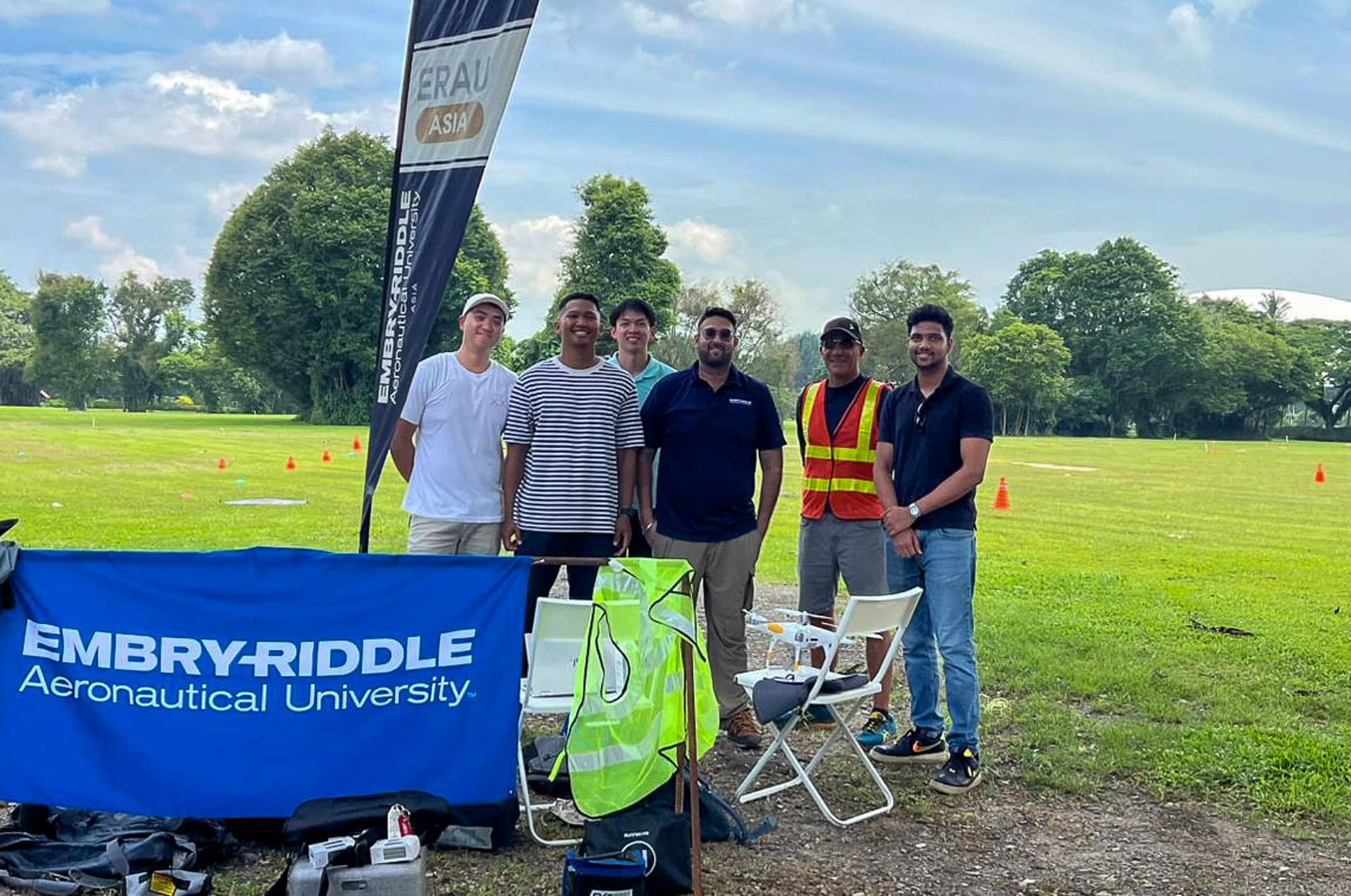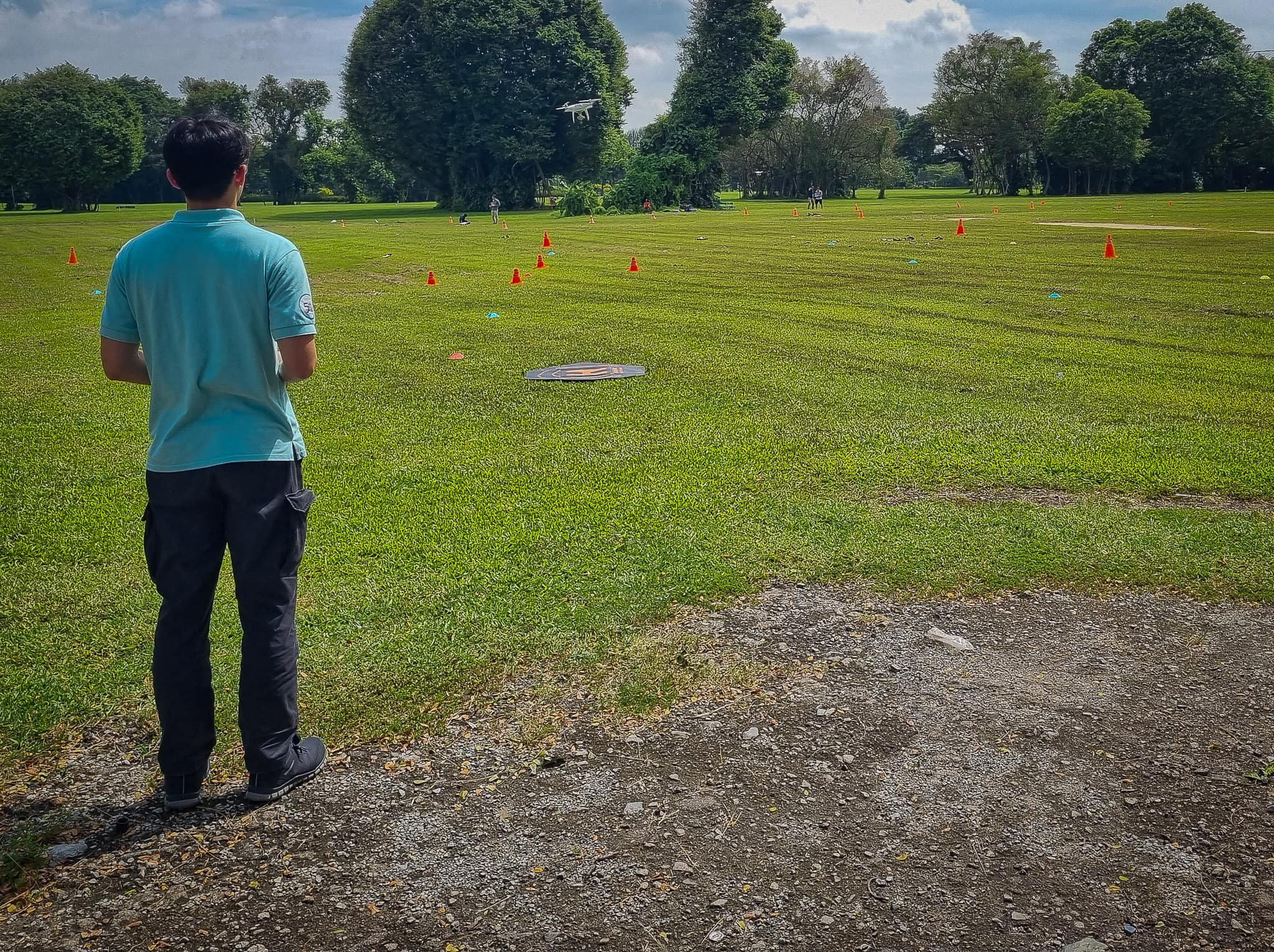First Embry-Riddle Worldwide Students Earn Pilot Licenses to Operate Drones in Singapore

The first cohort of students at Embry-Riddle Aeronautical University’s Asia Campus in Singapore has earned their pilot licenses to operate drones commercially in the country’s airspace.
The students recently graduated from a new uncrewed aircraft systems (UAS) program offered by the Worldwide Asia Campus in Singapore. The program received approval from the Civil Aviation Authority of Singapore (CAAS) to instruct and test students for Unmanned Aircraft (UA) pilot licenses in December 2023.
A UA Pilot License (UAPL) is required in Singapore for commercial UAS operations and for flying aircraft weighing more than 7 kilograms, about 15 pounds.
“This is a major step forward in supporting the safe and professional integration of uncrewed systems into Asia’s airspace,” said Dr. John Watret, chancellor of Embry-Riddle’s Worldwide Campus. “It reflects our commitment to global aviation excellence.”
The nine-week course, launched in August 2024, prepares students for both written and practical tests to obtain a UA Pilot License.
The course includes critical lessons on the regulatory and legal frameworks and penalties surrounding drone operations, risk mitigation and management, operational best practices, mission planning, data processing and manual flight skills.

The first Embry-Riddle students in a new uncrewed aircraft systems program at the Asia Campus in Singapore recently graduated. (Photo: Embry-Riddle)
“Students gain knowledge and skill in small UAS operations, including basic and advanced maneuvers, designed to prepare graduates for commercial drone operations in Singapore,” said Dr. David Thirtyacre, assistant professor of aviation and chair of the Flight Department at the Worldwide Campus.
While the U.S. Federal Aviation Administration only requires a knowledge test to receive a Part 107 Remote Pilot certificate, Singapore’s aviation authority also mandates a practical flight exam.
The commercial drone pilot applicants must demonstrate “flight proficiency in a variety of maneuvers and conditions,” Thirtyacre said.
This includes performing a figure eight maneuver, safely operating the aircraft while the nose is in different positions and flying under conditions where the GPS is deactivated, said David Cirulli, head of Flight Operations at the Asia Campus.
“Singapore is very restricted in its airspace because it’s a complex, urban airspace,” Cirulli said.
Embry-Riddle students benefit from having faculty members who serve as both training pilots and examiners in the program.
“The number of certified commercial UAS pilots in Singapore is very low,” Thirtyacre said.
Ian Alexander Kallat, a 27-year-old Aeronautics student who was among the first graduates of the new UAS program, was always interested in flying drones and viewed the course as a valuable opportunity to enhance his skills and employability in an increasingly technology-driven industry.
“What stood out to me most was how much practical, hands-on experience the course offered,” he said. “I tend to take a bit more time than others to get the hang of things. The extra practice definitely made a difference and helped me pass the practical assessment test on my first try.”
Kallat is now a flight operations intern with Skyports, a UK-based company pioneering the use of drones to transport cargo and supplies to ships anchored in Singapore’s busy harbor.
Having obtained his UA Pilot License, Kallat was immediately given the opportunity to fly drones in one of the company’s key projects, supporting the Maritime and Port Authority with aerial surveillance during emergency response operations, such as possible oil spills and vessel fires. He is now training with the DJI Matrice 30, an advanced commercial-grade drone.
“The Embry-Riddle course played a crucial role in helping me secure this internship. It enabled me to obtain the UAPL, and it equipped me with the foundational knowledge and skills to operate drones competently,” he said.
Matthew Flaherty, vice chancellor and head of Asia at Embry Riddle, said the success of the UAS program in Singapore “sets the stage for broader regional engagement and cooperation, and positions Embry-Riddle Asia as a future hub for UAS pilot training across the Asia-Pacific region."
